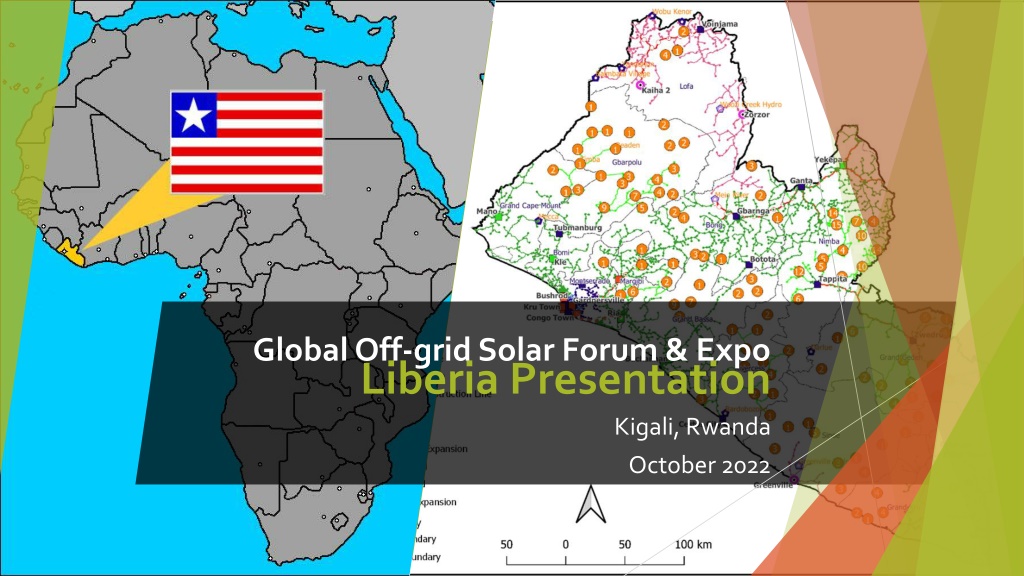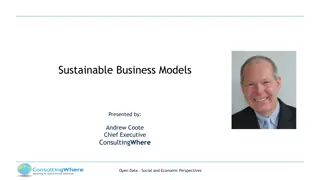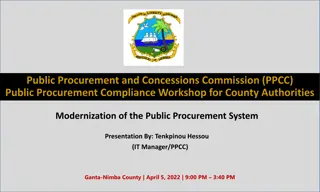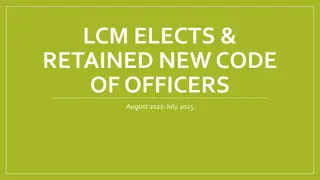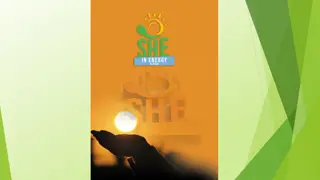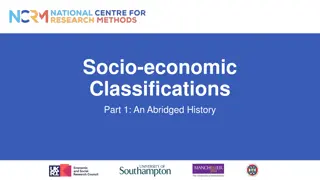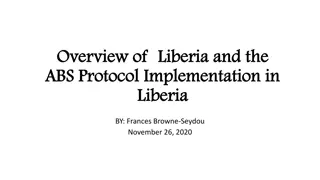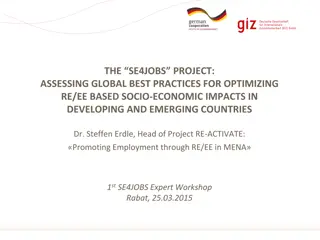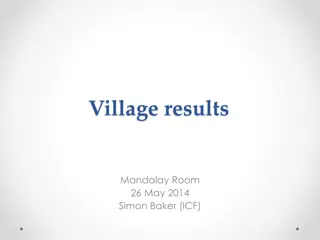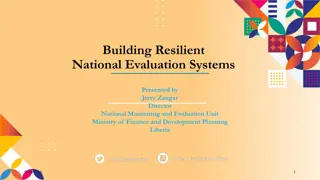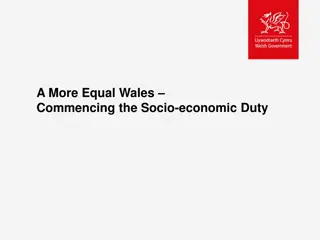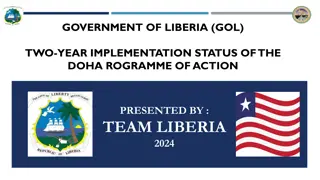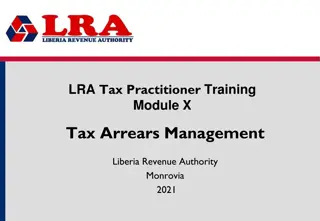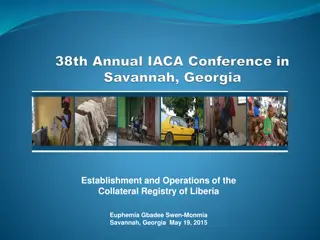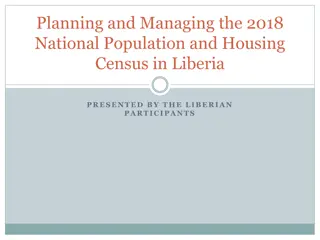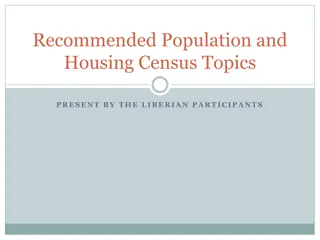Socio-economic Overview and Energy Access in Liberia
This presentation provides a comprehensive overview of Liberia's socio-economic landscape, energy access challenges, and climate change targets. It covers key data such as GDP, population, sectoral contributions, access rates, renewable energy targets, and more. The country aims to achieve 100% electrification by 2030, with a focus on main grid, mini-grids, and solar home systems. Other initiatives include promoting renewable energy, reducing GHG emissions, and improving energy efficiency across various sectors.
Download Presentation

Please find below an Image/Link to download the presentation.
The content on the website is provided AS IS for your information and personal use only. It may not be sold, licensed, or shared on other websites without obtaining consent from the author. Download presentation by click this link. If you encounter any issues during the download, it is possible that the publisher has removed the file from their server.
E N D
Presentation Transcript
Global Off-grid Solar Forum & Expo Liberia Presentation Kigali, Rwanda October 2022
Socio-economic data Energy access and climate change Off-grid energy policy, legal & regulatory framework Table of Contents Off-grid energy initiatives, challenges & lessons learnt Private sector participation opportunities in off- grid sector End-user subsidy Results-based financing for SHS PVOC-linked Duty waiver on off-grid energy products
Socio-economic data Country group: Least developed, low-income economy Gross Domestic Product (GDP): $3.222 billion (nominal, 2019 estimate) GDP per Capita: $704 (nominal, 2019 estimate) Population(estimated): 5,073,296 GDP per Sector: Agriculture-34%, Industry-13.8%, Services- Main industries: mining (iron ore, gold, diamond), rubber & palm oil processing GDP Rank: 158th (nominal, 2019 estimate) Human Development Index: 0.465 (2018); 176th ranking 52.2% Social Factor index: 52.3 out of 100 Population in poverty: 40.9% Life expectancy: 64 years Median age: 19 years
Electricity and Climate Change Targets & Current Access GHG Emissions reduction(NDC) targets: reduction by 64% by 2030 Current GHG Emissions: 0.02% of global emissions, but among 5 most vulnerable countries to climate change NEA Electrification access targets: 100% by 2030; with 70% of population to be electrified by main grid, 5% by large mini-grids, 6% by small mini-grids & 19% by solar home systems. Current Electricity access rates per areas: 20% in urban areas & 5% in rural areas Current Electricity access per technology:main grid 7%, offgrid 21% Current Installed electricity generation capacity: 138 MW RESMP Renewable electricity targets: 150MW or 75% share of electricity generation by 2030 Current Renewable electricity generation capacity: 88 MW (64% share of generation) Energy Access & Climate change
Energy Access & Climate change Other than Electricity Access Targets as per RESMP: Solar Water Heating suppliers and installers available in every County Capital, Universal use of pre-paid meters from 2020 onwards and availability of 1 Amps, Total energy losses on rural electricity below 12% by 2030, Universal access to efficient lights, TVs, refrigerators and freezers at affordable prices, Cooking gas available in all County Capitals and gas stations at affordable prices with at least one reception and storage facility in Liberia, Universal access to affordable and efficient locally manufactured cook stoves with the target of 250.000 efficient cook stoves sold until 2030, Increase the share of efficient charcoal production to 60% by 2020 and 100% by 2030
Off-grid Energy Policy, Legal & Regulatory Framework 2009 National Energy Policy: goal to ensure universal access to modern energy services in an affordable, sustainable and environmentally friendly manner in order to foster the economic, political and social development of Liberia. It laid the basis for several energy sector reforms including the establishment of the Rural and Renewable Energy Agency(RREA) and enactment of the 2015 Electricity Law. 2015 Act Establishing RREA: with mandate to facilitate and accelerate the economic transformation of rural Liberia, by promoting the commercial development and supply of modern energy services to rural areas with an emphasis on locally available renewable energy resources. A rural energy strategy and masterplan laid out in 2015 with target to electrify 35% of rural populations by 2030 including other renewable energy targets including clean cooking. 2015 Electricity Law: laid out to unbundle monopoly of the state utility to serve as national utility company and as transmission system operator; allowing private sector participation in electricity generation, distribution and sale. Also served as a legal basis for establishment of the Liberia Electricity Regulatory Commission. Electricity sector regulations: issuance of several regulations including Electricity Licensing, Micro-utility licensing, Grid code, Mini-grid code, Distribution code, Customer Service & Quality of Supply, Multi-year Tariff Methodology, Tariff Regulations, Technical regulations on solar energy (in draft).
Off-grid Energy Policy, Legal & Regulatory Framework Mini-grid Policy: lays out strategy for electrification by deployment of mini-grids(isolated and inter-connected) with private sector participation by solicited proposals (through international competitive bids on a Lease-Operate-Transfer arrangement) & unsolicited proposals (through award of grants on a Build-Own-Operate or Build-Own-Operate-Transfer arrangement). National Electrification Strategy: least cost geospatial plan to accelerate/expand electrification to achieve universal access by 2030 with 70% of population to be electrified by main grid(expansion & densification), 5% by large mini-grids, 6% by small mini-grids & 19% by solar home systems. Executive Order # 107: issued by the President for one year period suspending import duty on quality-verified solar photovoltaic products, appliances and system components. Technical regulations and Pre-export Verification of Conformity importation guidelines are being finalized as framework for implementation.
Off-grid Energy Initiatives-Challenges & Lessons learnt Lack of regulatory environment for installation & maintenance of solar PV systems Limited technical capacity for installation & maintenance of solar PV systems Limited access to finance for SHS Companies Limited households affordability Competition from low- quality products, appliances and components Uncertainty on grid extension & mini-grid electrification programs Poor road infrastructure for distribution networks Limited telecommunication network coverage Fragile economy (fluctuations of exchange & interest rates)
Private Sector Participation Opportunities in Off-grid sector Through new market entry or partnership with local firms: Agricultural Productive Use of Energy offgrid systems: given the high demand for processing, storage & preservation of agricultural outputs such as rice, cassava, rubber, aquaculture etc, Solar Home Systems: given the low access to electricity rates mainly in rural areas ( 5%) and targets to electrify 19% of households through stand-alone systems by 2030, Clean cooking: given the targets as per the Rural Energy Strategy & Masterplan to distribute 250,000 units of clean cookstoves, availability of cooking gas into county capitals, and increasing the share of efficient charcoal production to 60% by 2020 and 100% by 2030. Liberia Energy Sector Investment Forum November 9-10, 2022 in Monrovia, Liberia BOOK YOUR CALENDAR
End-User Subsidy Results-based Financing for SHS Joint implementation of a World-Bank funded Liberia Energy Sector Strengthening & Access Project and DGIS-funded EnDev Demand-side Subsidy program in 4 Sub-Saharan African countries: LESSAP Off-grid Phase I pilot: Geographical focus: rural & semi-urban Liberia Implementation period: Jan 2021 to June 2026 Funding envelope: US$ 2million Targeted beneficiaries: 6,500 households Eligible technologies: VeraSol certified solar home systems 350Wp Targeted regions: last-mile poor rural & semi-urban offgrid areas EnDev Global Demand-side subsidy component: Geographical focus: 4 countries in Sub-Saharan Africa including Liberia Implementation period: Aug 2022 to Sept 2025 Target group: Marginalized / low-income households Eligible technologies: Off-grid solar or clean cooking (depending on country context and scale-up potential) Expected results across all countries: 1,000,000 persons Funding envelope for Liberia: 3.8 million for DSS pilots on off-grid solar
PVOC-linked Duty waiver on off-grid solar PV products Importer obtains a Certificate of Conformity from PVOC Service Provider after pre- shipment inspection Importer obtains Quality Certificate from NSL after a Conformity Report from the PVOC Service Provider Importer obtains a License of Importation from RREA Consignment delivered and inspected at port of entry Importer obtains Duty Waiver Authorization from LRA Importer ships consignment Importer takes delivered of compliant consignment of products
